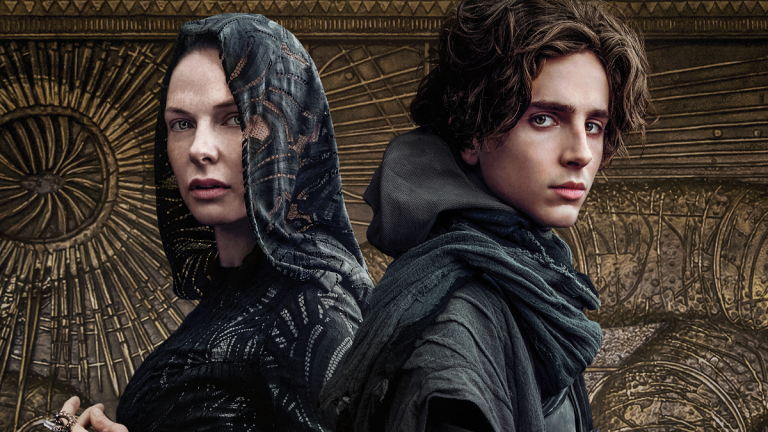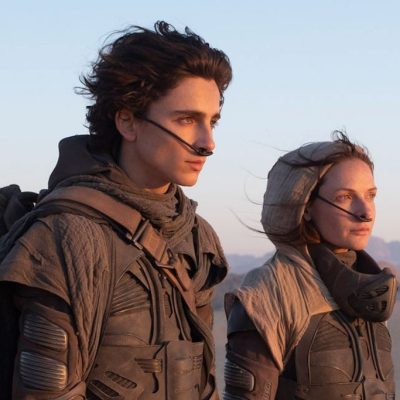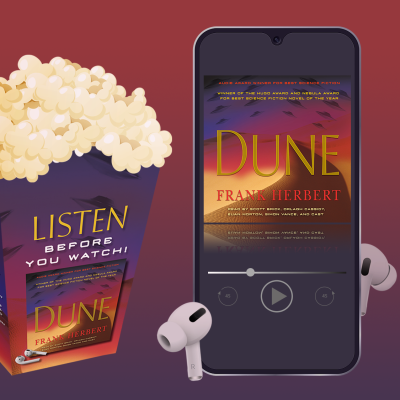Visions of Dune: Bringing the Ultimate Sci-Fi Epic to Life
Almost 60 years after its first publication, Denis Villeneuve is doing right by Frank Herbert’s epic novel. We have the inside story of Warner Bros. new Dune movie.

The story of 2021’s Dune begins with a kid falling in love with a book. Before he was the world-famous film director of Arrival and Blade Runner 2049, Denis Villeneuve was a teenager who devoured sci-fi novels. When he was “between 13 and 14,” he remembered seeing “these eyes.” The iridescent blue eyes were on the face of a man staring at the young Villeneuve, painted by Wojciech Siudmak, for the 1970 French paperback translation of Dune. Villeneuve was utterly mesmerized by the cover. “When you’re a kid, the covers can really make an impact,” he says. “The artists that were drawing them were so talented that even though I had never heard of Dune, I was drawn to that title and the simplicity. I was always attracted to the desert.”
Like many serious readers of science fiction, Villeneuve’s obsession with Dune began free of artistic pretension. “I instantly fell in love with it for several reasons,” he says. “The way Paul is trying to find his identity while finding his home in another culture, with the Fremen. I was fascinated by the way they need to survive and adapt…I have always been in love with biology, the science of life, of nature. The way Frank Herbert used biology was insanely beautiful. To me, reading Dune is like a paradise. The book stayed with me all these years.”
When you talk to Villeneuve now, childhood giddiness illuminates the corners of everything we’re talking about. Yes, Villeneuve loved Star Wars, too (“The Empire Strikes Back is always good for the soul,” he says). But what makes Dune so much different from other popular heroic epics is that, despite the escapist sweep of the story, its underlying message is anything but escapist. The story of Paul Atreides is not an aww-shucks hero’s journey. In her 1978 review of Star Wars, Ursula K. Le Guin referred to the protagonist of that film as “Huck Skywalker.” And when you think of the story of Dune in that way, no one would confuse Paul Atreides with any member of the Skywalker clan.
The story of Dune concerns a powerful family—House Atreides—being pushed into a terrible situation on the planet Arrakis by opposing forces on all sides. Smack dab in the middle of that is the notion that Paul could—and will—initiate a huge uprising against his enemies at some point in the future. Paul, and his parents—Lady Jessica (Rebecca Ferguson) and Duke Leto (Oscar Isaac)—set out to do good, but create even more conflict as a result.
“At the very core of Dune is a warning,” Villeneuve says. “Anyone who is trying to blend religion and politics—that is a dangerous cocktail. I think Herbert wrote it as a warning, [against] leaders that pretend to know what will happen, who pretend to know the truth, who might be lacking humility. When someone behaves like a Messiah, you have to be careful.”
A Boy and His Sandworms
One of the messiahs of Dune is a guy destined to have multiple names: Muad’Dib, the Kwisatz Haderach, and, of course, Paul Atreides. On our planet, he’s known as Timothée Chalamet. Ferguson says that Chalamet’s unique qualities as an actor were the “essential” elements that make the movie work. “Timmy brings the smaller to the grander,” she says. “He’s carrying this huge movie, and it’s lazy of me to use this word, but he brings such an indie feel to it.”
When it comes to “indie” films that nearly everyone knows about, Timothée Chalamet is one of the most famous male actors on the planet in 2021. From his roles in Call Me By Your Name to Little Women, Chalamet has the kind of star power that is subtle and undefinable, because as Ferguson points out, he’s not playing the role to seem like a big movie hero. Paul Atreides is the opposite of a Han Solo or Captain Kirk type, and so is Chalamet. “I always tried to bring Paul Atreides back to the ground,” Villeneuve says. “I told Timothée, you are the hero, of course, you are a tremendous fighter. But I think you have the burden of having a very strong instinct that will be boosted by spice.”
Chalamet reveals that in terms of becoming that “tremendous fighter,” some of his hand-to-hand training happened in a wine cellar while filming Wes Anderson’s The French Dispatch. Chalamet also asserts that working with Villeneuve on Dune didn’t feel like being involved in a Hollywood blockbuster, and that transitioning from The French Dispatch to Dune made perfect sense. “It felt like working on a high-level indie,” Chalamet says. “I haven’t worked with the Coen Brothers, but I imagine it would be like this, just on a bigger scale. The Dark Knight is what made me want to act. It has incredible behavioral specifics. It has incredible performances and in the middle of it are sweeping cinematic sequences. In a way, Dune is like that. When you can get on a project of this size that has this much dramatic integrity, working with one of the best directors in the world right now, it’s exactly what I wanted.”
Chalamet says that beyond fight training, immersing himself into the world of Dune and “spending time with the props,” was important to feel a connection to the objects of Paul’s world. He also didn’t shy away from the idea that this was yet another adaptation of a beloved book. “I learned that from Greta Gerwig when I did Little Women. Nobody minds another good movie based on a good book.”
But for Chalamet, the journey isn’t quite over. “I’m champing at the bit to film Part 2,” he says. “I read all of Dune Messiah in lockdown. I’m ready.”
A New Dune, For Everyone
Perhaps unfairly, being really into Dune carries with it a kind of connotation that only the truly nerdy at heart get why science fiction devotees are so obsessed with the spice. John Hodgman makes two jokes about “Third Stage Guild Navigators” in his book Medallion Status. In Russian Doll, Nadia uses the phrase “Jodorowsky’s Dune” as a nerdy password to gain access to a back room. When Patrick Stewart was cast in Star Trek: The Next Generation, to his fellow castmates he was “the guy from I, Claudius,” while to writers like Michael Chabon, he was “the guy from Dune.” Unlike Star Wars or The Lord of the Rings, the broad appeal of Dune has always been tentative. But, in addition to Chalamet’s favorable comparison to The Dark Knight, Villeneuve makes it clear that the purpose of this Dune wasn’t to just make book readers happy.
“It would be so easy to make a Dune movie only for hardcore fans,” Villeneuve says. “My goal was to please the hardcore fans, that they feel the spirit, the poetry, and the atmosphere of the book—but to make sure that someone who had never heard about Dune would also have fun and understand the story. I had to make sure that everyone would be on board right at the beginning.” To that end, the new Dune sports a radical narrative shift from the source material. In this version, the opening narration and framing of the story is given by Chani (Zendaya), a member of the Fremen tribe, native to Arrakis.
Villeneuve describes this as one of his “bold” decisions but stresses that the narrative point of view doesn’t change the story at all. Logistically, the story of Dune is about House Atreides coming to take over the spice mining on the planet Arrakis. The native Fremen have been abused and tortured by previous occupiers, House Harkonnen, so in the new opening narration, Chani wonders “who will be our new oppressors,” a line not spoken in the book. Instead, the narrative framing of the novel is from the quasi-historical point of view of Princess Irulan, a woman Paul eventually marries for purely political reasons. So, what Villeneuve has done by giving the opening narration to Chani is flip the point of view from the aristocracy to the working class.
Villeneuve also says that elevating Chani’s role, and the roles of several of the female characters, was all because the movie required “bold” decisions to become the best film version of the story possible. “A book and a movie are totally different mediums. I had to make certain decisions. This is why I decided to make the first book into two movies. I had to condense some ideas to tell the story in the most eloquent way possible so that it will be understood by everybody,” Villeneuve says. But he’s also quick to point out that adaptation is not the same as leaving things out on purpose. “When you adapt it’s an act of vandalism. You will change things. But, from the beginning, I said to the crew, to the studio, to the actors: ‘the bible is the book. We will, as much as possible, stay as close as possible to the book.’ I want people who love the book to feel like we put a camera in their minds.”
Ferguson’s Lady Jessica is arguably the character who sets the story of Dune into motion. In this future-world, the mystical matriarchal order of the Bene Gesserit can control the sex of babies that are born into its sisterhood. And in defiance of her orders from her fellow Bene Gesserit, Jessica had a son, instead of a daughter. Jessica asserting her right to choose, in essence, makes it all happen. Ferguson believes the emotional power of these stories is more important for audiences than the nitty-gritty specifics. “We can go into some kind of nano version of ourselves, but if it doesn’t read through on the screen, to the audience, it isn’t worth doing.”
Read more
Talking about accessibility, Ferguson says that she believes the new Dune represents an ongoing paradigm shift of artistic and thoughtful science fiction in the 21st century. “Once the door’s open and you know that there are so many incredible stories within science-fiction storytelling, there’s musicality and rhythm that is needed to create these worlds within worlds, it’s very complex, everyone doesn’t get it.”
But, even though there are levels of “philosophy” and “complexity” to Dune, Ferguson feels that the film doesn’t operate in spite of its level of detail, but because of it. “The sandworms, the resources of the stillsuits, I could go on forever,” she says. “In this film, it’s the details, the smaller things that matter.”
Seeing the Future
Spoiler alert: if you’ve never read Dune, the book itself actively tries to spoil the pages ahead. Whether it’s snippets of imaginary historical texts that open each chapter or the prophetic flashes of Paul Atreides, the story of Dune sprinkles flavors of its own future into the beginning, middle, and end. There are many reasons why Frank Herbert’s book reshaped the notion of what an epic science fiction novel could be, but the idea that the narrative is always a little ahead of itself is a big part of its addictive power.
“It’s not something you’d have any sort of self-conscious perspective on,” Chalamet says, speaking of Paul’s early moments of clairvoyance in the story. Before Paul goes to the titular planet of Arrakis and meets Chani, he has glimpses of his future, and later, during a fateful first meeting with a sandworm, the near-magical spice brings that vision into focus. Chalamet says that in playing Paul, these scenes required careful subtlety in order to convey a realistic sense of knowing one’s own future.
“It’s a layer,” Chalamet explains. “As opposed to lucidly having visions of a pleasant landscape. These aren’t futures that are something [Paul would] would be happy to skip into. What he’s seeing and feeling is a visceral experience of a hyper-specific telling of tragedy, but also that he has a hand in that tragedy. If you were going through that it would be a hell of an experience.”
As Chalamet points out, the spoilers for Dune “have been out there for four decades,” so, for old fans, the true lure of the new film version is discovering how the things we know are coming, will make us feel. For longtime spiceheads, watching Chalamet in the first Dune trailer was like the opposite of Paul’s traumatic flash-forward: we see the hyper-specific events, and we’re hoping for an emotional victory. For those who have waited for a perfect film version of Dune for several decades, there’s almost no “self-conscious perspective” left. From the tribulations of Alejandro Jodorowsky’s unmade film to David Lynch’s divisive 1984 version to the uneven Sci-Fi Channel iterations from the 2000s, hoping for a worthy adaptation of Dune, has, for fans, been a hell of an experience.
But this time, with this director, and this cast, the future looks good. And yet, even if you know every spoiler, and have every detail of every character’s journey clear in your mind, with this Dune, we still don’t really know what the emotional future holds, exactly. The Bene Gesserit Litany Against Fear tells us “fear is the mind-killer,” and so, for the new Dune, the hope must flow.
A Dune Movie Trilogy?
When directing Timothée Chalamet through his visions of the future, Villeneuve says he was careful to point out that “the future is shifting, the future is always in motion, so it means sometimes these visions are not always accurate.” The same could possibly be said for what audiences can expect for a sequel to Dune. As Chalamet confirms, “we’ve only filmed the first part of the story,” meaning, what everyone will be waiting for next isn’t a sequel to Dune, but simply the rest of Dune. With a TV series in the works for HBO Max—Dune: The Sisterhood—how much more of this world should we expect?
According to Villeneuve, the goal is a trilogy.
“I always thought there would be two movies for the first book. And I always thought Dune Messiah would be a powerful film. I always saw a trilogy.” Chalamet is also primed for one more film beyond Dune: Part Two, revealing that he thought Dune Messiah “was amazing, and in some ways, more traditional than the first book. I’d love to do it, when and if we—hopefully—get to it.”
In addition to a pandemic and the shifting schedules of various actors, completing Dune: Part Two any time soon seems overly optimistic. But Villeneuve is hopeful that he will make the trilogy. “Well, my mind didn’t go much further after that!” he says. “That’s already a lot. The books after that get a little more complex. But I do see three movies.”
In an uncertain time, Dune feels like a shockingly prescient social lens. Ferguson says she believes that “when people are depressed, they go for musicals or sci-fi,” and that Dune serves as a kind of balm for the anxieties of the culture at large. From climate change to imperialism, the book and the film shine an adventurous light on what Chalamet believes isn’t a prediction of the future, but rather “a projection” of what might happen. If Dune does its job, it won’t just start conversations about the future of cinema, but perhaps the future of the planet, too. In real life, there may be no golden path for humanity, but for now, with one ambitious work of cinematic expression, the sleeper has awakened.
Dune opens in cinemas and on HBO Max on October 22


